Sora Park (b. 1992) works with a focus on social issues that emerge within contemporary digital media environments such as social media spaces and the metaverse. In particular, she pays attention to phenomena intensified and exposed by the advancement of science and technology, imagining possible situations, characters, and products that could arise in a future where today’s problems have further deepened. She visualizes these ideas through a variety of mediums, including sculpture, video, and installation.
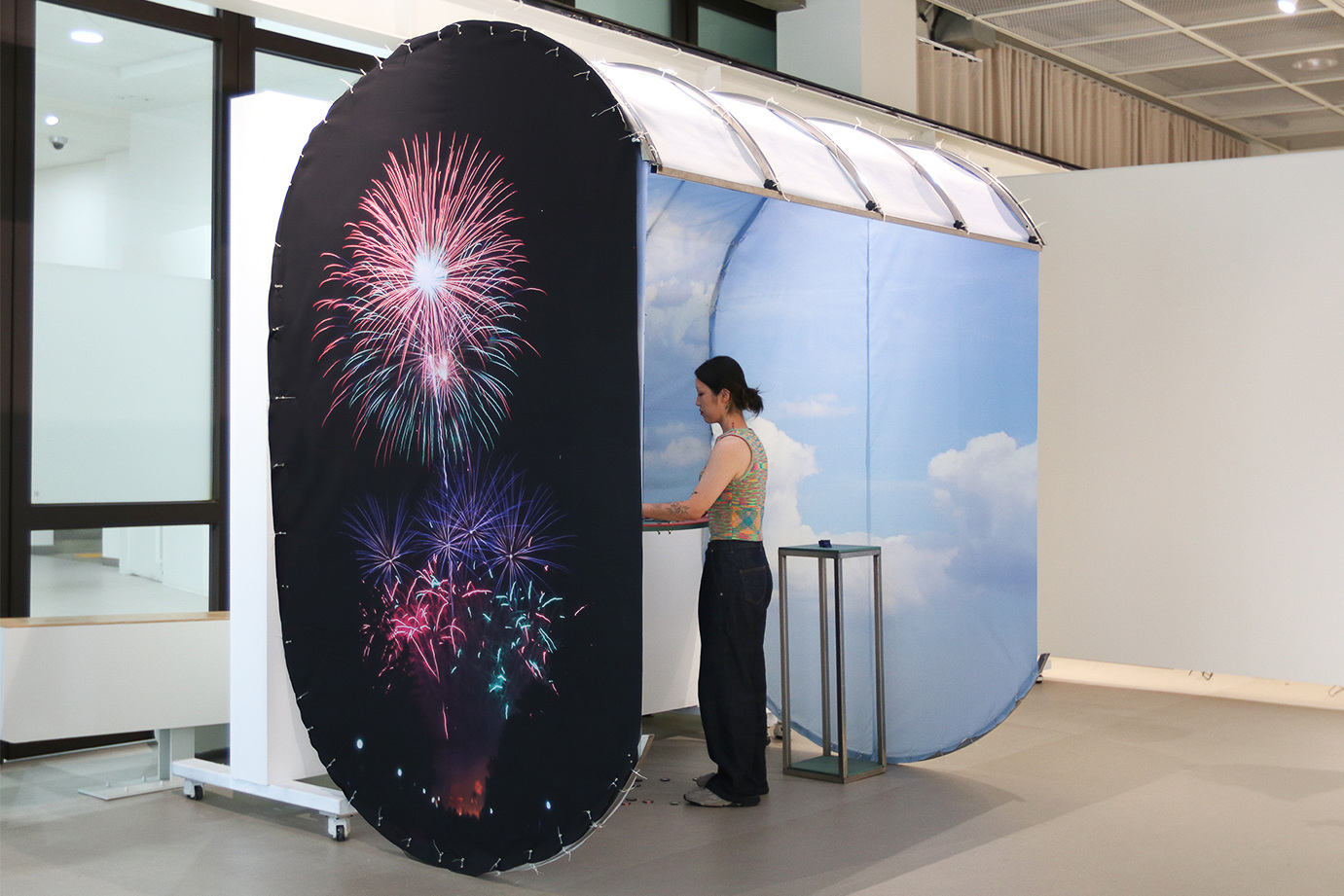 Sora Park,
Double or Nothing, 2021, MDF, rail motor, casino chip,
stainless steel, digital printing on fabric, 244x180x275cm ©Sora Park
Sora Park,
Double or Nothing, 2021, MDF, rail motor, casino chip,
stainless steel, digital printing on fabric, 244x180x275cm ©Sora ParkSora Park’s work begins with observing how
society and technology influence and transform one another. In particular, she
focuses on how digital technology shapes modes of communication and the ways in
which technology intervenes in human thought within algorithm-driven social
media environments.
She has also continuously explored how
individuals project themselves as images in social media spaces, and how these
images, in turn, affect their perception of self.
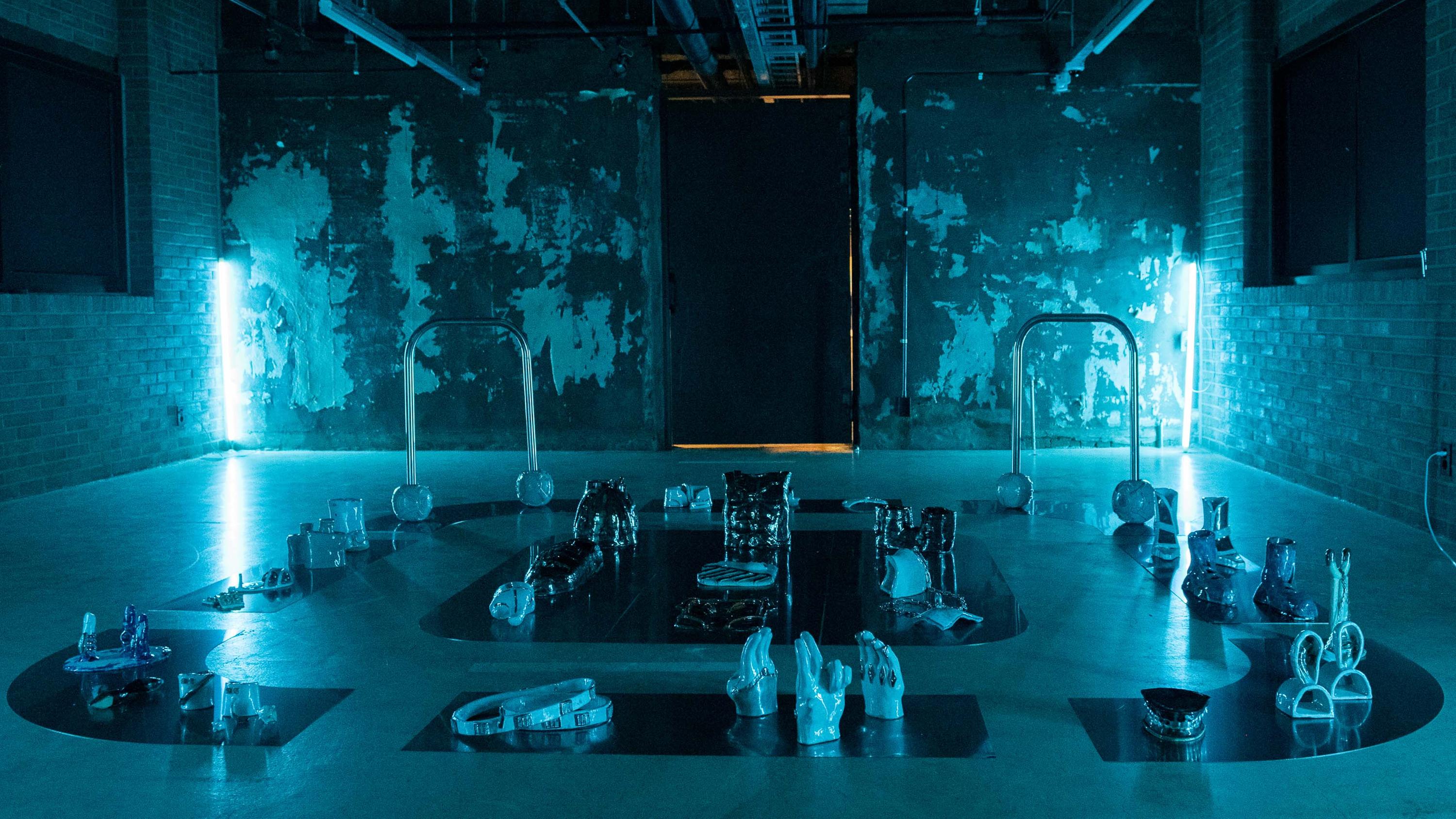 Sora Park,
Item Inventory, 2021, Stoneware ceramics, stainless steel,
platinum, Dimensions variable ©Sora Park
Sora Park,
Item Inventory, 2021, Stoneware ceramics, stainless steel,
platinum, Dimensions variable ©Sora ParkFor example, her 2021 work Item
Inventory begins with an exploration of the relationship between a
player’s self and body, and the virtual existence of a character within a game
environment. Park observed that, because the player directly controls an avatar
in the virtual world, a game character can be regarded as an extension of the
user’s self or body.
Furthermore, she noted that the clothing
and items of online game characters, which enhance their body enhancement or
grant special abilities, share similarities with the functions of wearable
devices in the real world.
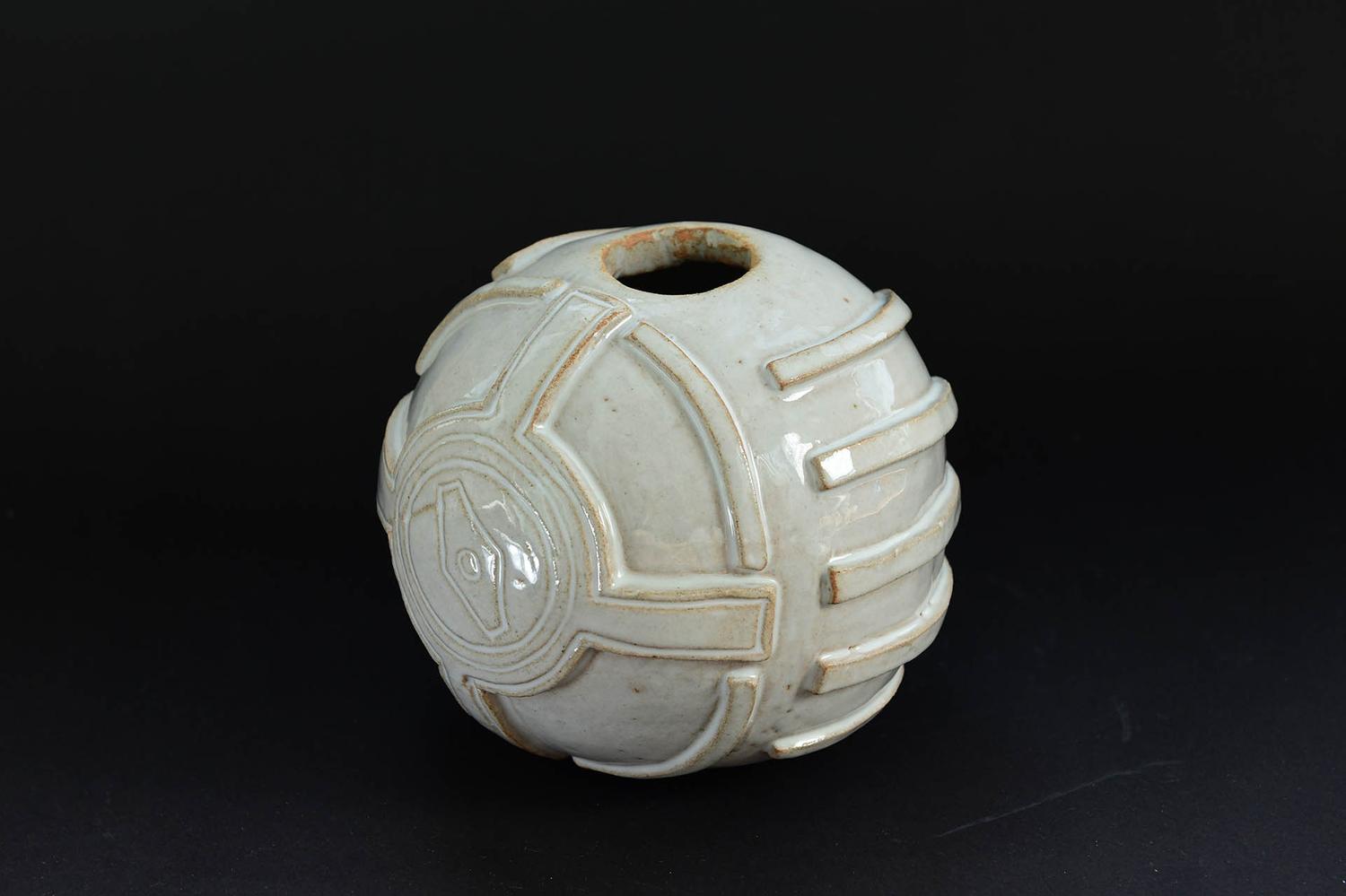 Sora Park,
Item Inventory, 2021, Stoneware ceramics, stainless steel,
platinum, Dimensions variable ©Sora Park
Sora Park,
Item Inventory, 2021, Stoneware ceramics, stainless steel,
platinum, Dimensions variable ©Sora ParkIn response, Park created a ceramic
sculpture series by combining visual digital elements such as game character
costumes, in-game items, and gaming devices. She then arranged these works in
the gallery space as if they were part of an online game’s item inventory,
aiming to evoke a distinctive and uncanny atmosphere.
By recreating visual elements found in
networked digital spaces through ceramics, her work blends digital aesthetics
with the familiar qualities of traditional craftsmanship. This fusion offers
viewers an opportunity to reflect on humanity’s long-standing creativity and
productivity.
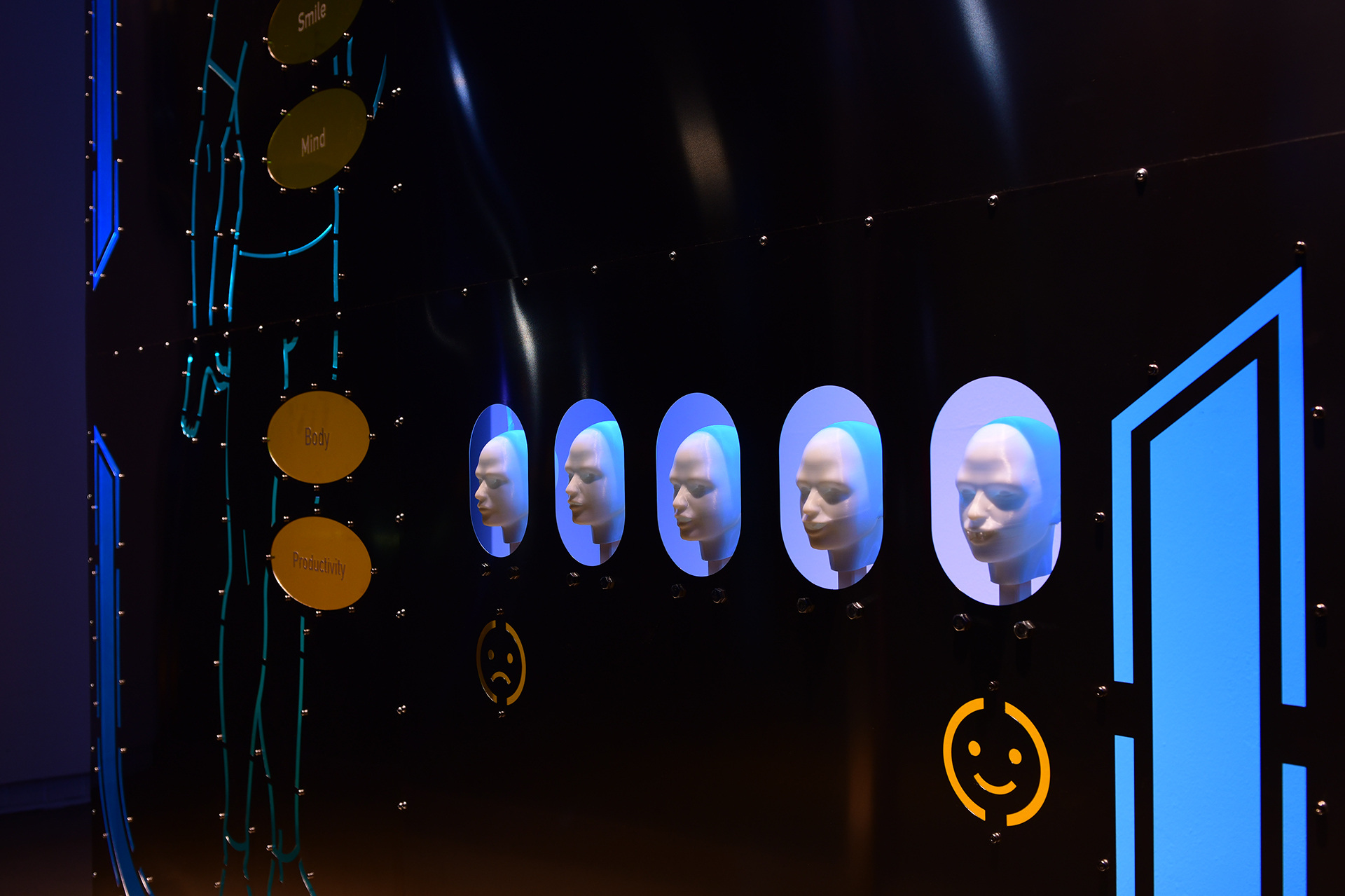 Sora Park,
Connect-Disconnect-Reconnect, 2021, Stainless metal, acrylic
panels, 3d printed headgear, Dimensions variable (2400x2400mm each) ©Sora Park
Sora Park,
Connect-Disconnect-Reconnect, 2021, Stainless metal, acrylic
panels, 3d printed headgear, Dimensions variable (2400x2400mm each) ©Sora ParkHer exploration of the connection between
game character clothing items and contemporary wearable devices continued in
her 2021 solo exhibition 《Connect-Disconnect-Reconnect》
at the Daegu Arts Center.
Park focused on the phenomenon of digital
media extending our bodies and minds from physical space into the digital
realm. Using the aesthetic qualities of wearable devices alongside the
conceptual aspects of personal digital gadgets, she envisioned possible
technologies of the future.
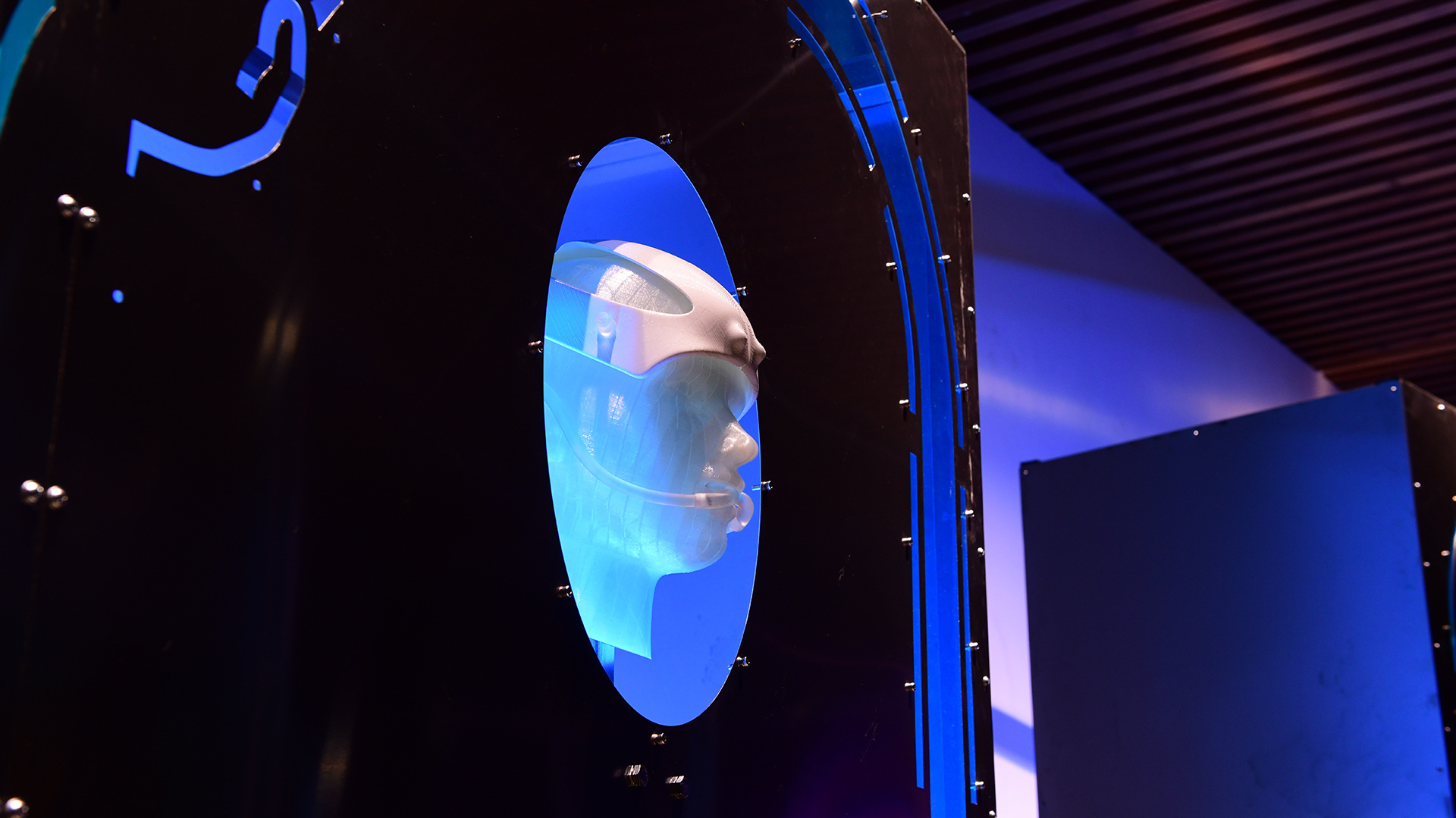 Sora Park,
Connect-Disconnect-Reconnect, 2021, Stainless metal, acrylic
panels, 3d printed headgear, Dimensions variable (2400x2400mm each) ©Sora Park
Sora Park,
Connect-Disconnect-Reconnect, 2021, Stainless metal, acrylic
panels, 3d printed headgear, Dimensions variable (2400x2400mm each) ©Sora ParkIn this project, the artist imagined a
fictional wearable headgear designed to train emotions and developed its
product design. The concept was then realized as a sculptural prototype using
3D modeling and printing technologies.
Connect-Disconnect-Reconnect
(2021) employs the language of science fiction to depict a contemporary reality
in which the human body and emotions are continually subject to development. It
reflects on how, in today’s culture of self-improvement, positive emotions are
often treated as resources to be cultivated for the sake of individual
productivity and achievement.
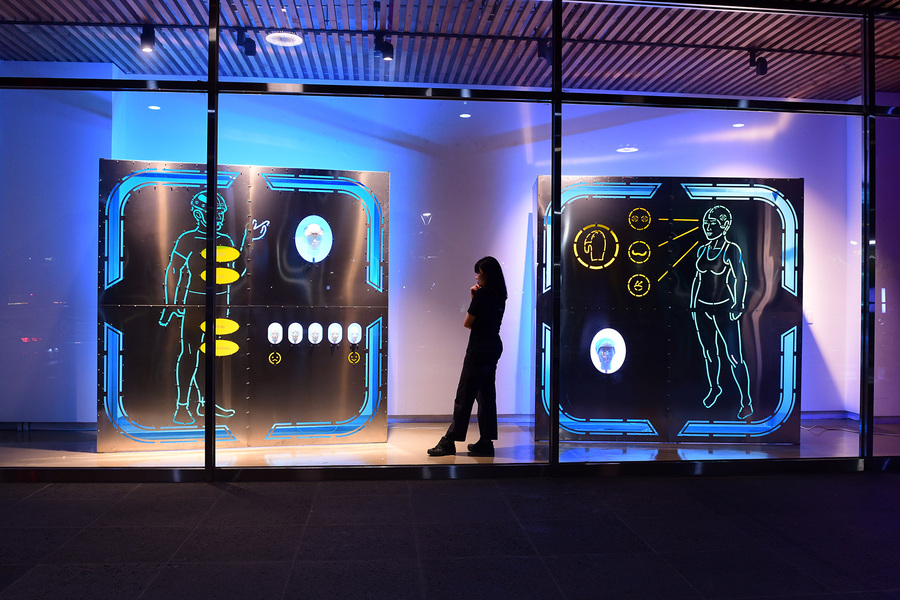 Sora Park,
Connect-Disconnect-Reconnect, 2021, Stainless metal, acrylic
panels, 3d printed headgear, Dimensions variable (2400x2400mm each) ©Sora Park
Sora Park,
Connect-Disconnect-Reconnect, 2021, Stainless metal, acrylic
panels, 3d printed headgear, Dimensions variable (2400x2400mm each) ©Sora ParkIn this way, her conceptual approach begins
with a critical perspective on the social issues that arise in tandem with
today’s scientific and technological developments, and then extends to
imagining how these realities might intensify in the future. Through such
speculation, the artist envisions specific “products” that might emerge in
these future scenarios and visualizes them in the form of “models.”
Alternatively, she imagines various
episodes that could unfold in the future if the problems we currently face were
to worsen, developing these scenarios into narratives by writing them herself.
This process can evolve into video or installation works alongside sculptural
models, with the two methods applied either independently or combined within a
single work.
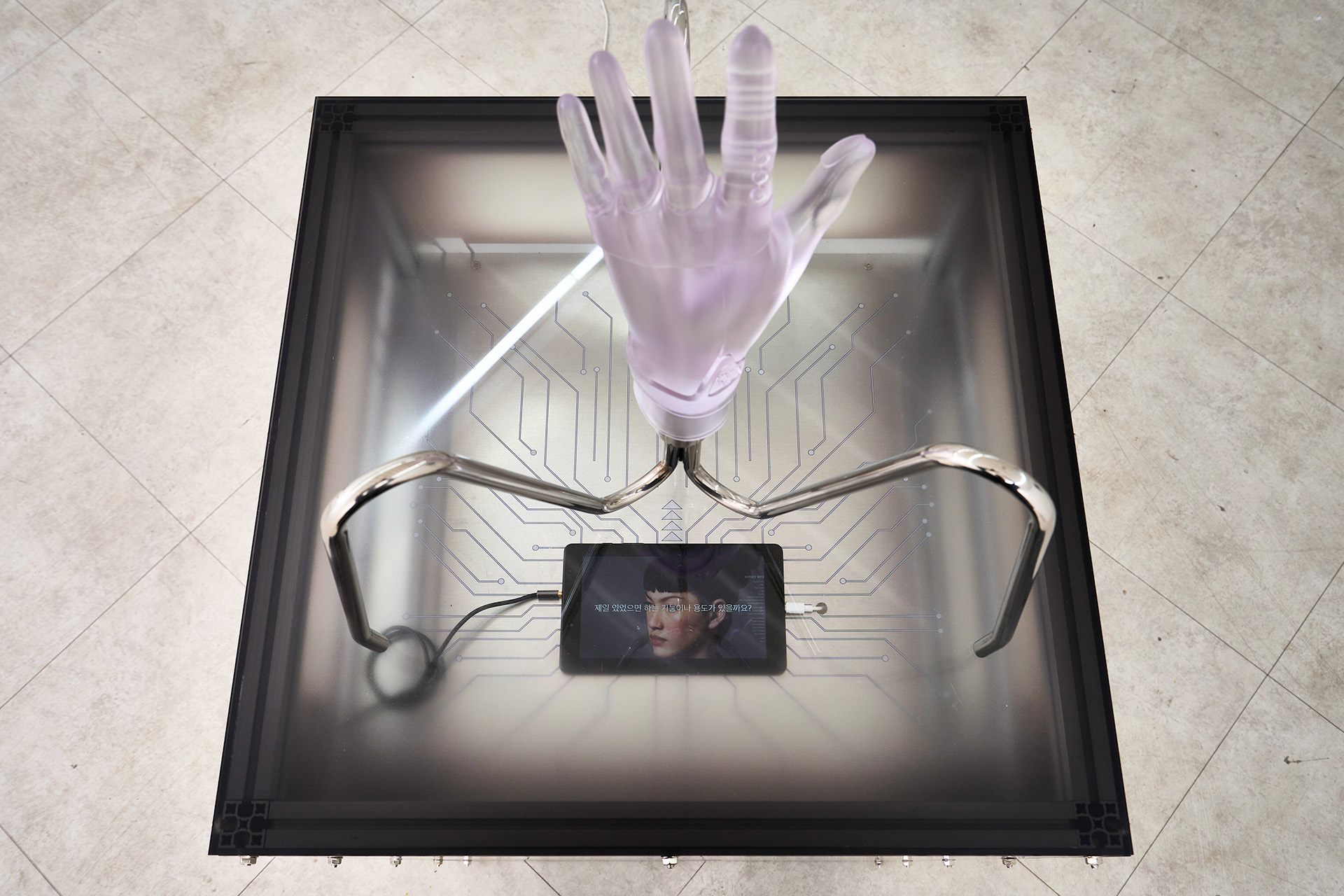 Sora Park,
Soft Touch, 2022, resin, stainless steel, video (5:01) ©Sora
Park
Sora Park,
Soft Touch, 2022, resin, stainless steel, video (5:01) ©Sora
ParkFor example, the 2022 work Soft
Touch is set in a future moment where the advancement of network
technology has accelerated. This project unfolds under the premise that a
fictional wearable designer named “Dr. Sara Park” designs an imaginary wearable
device for “James Kim,” a virtual human influencer who lives and works within a
digital game world, presenting its prototype as a sculptural work.
Through its futuristic imagination of
virtual space and its inquiry into clothing and human appearance within the
digital realm, the work reflects contemporary social and cultural conditions
while envisioning a future scenario that may yet come to pass.
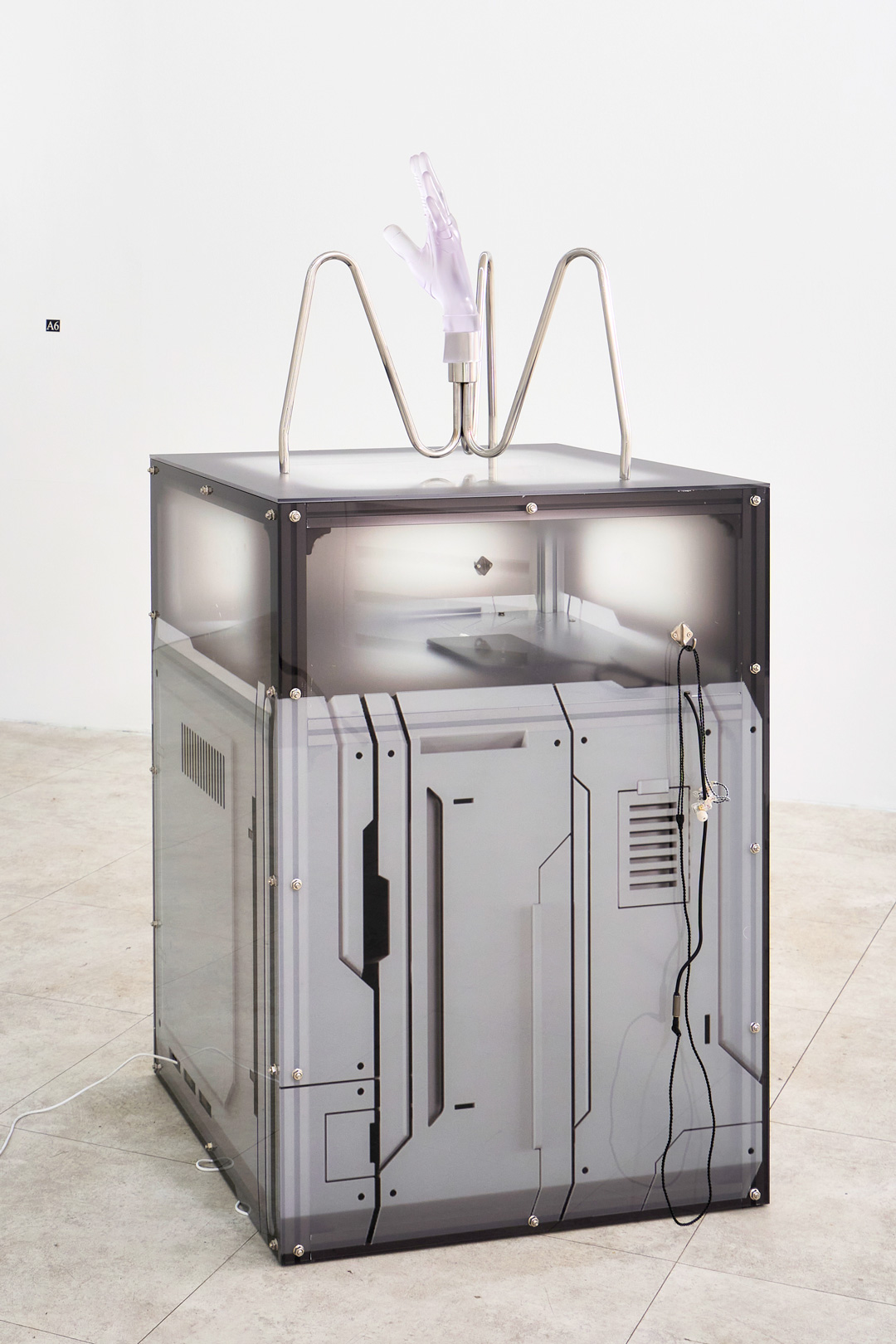 Sora Park,
Soft Touch, 2022, resin, stainless steel, video (5:01) ©Sora
Park
Sora Park,
Soft Touch, 2022, resin, stainless steel, video (5:01) ©Sora
ParkThe work, composed of fictional short dialogues and centered around an imaginary wearable device, reflects contemporary social phenomena and issues—such as the obsession with the ‘perfect body,’ economic inequality expressed through paid services, and the fast-paced consumption of modern digital communication—by reframing them through the language of science fiction set in a future perspective.
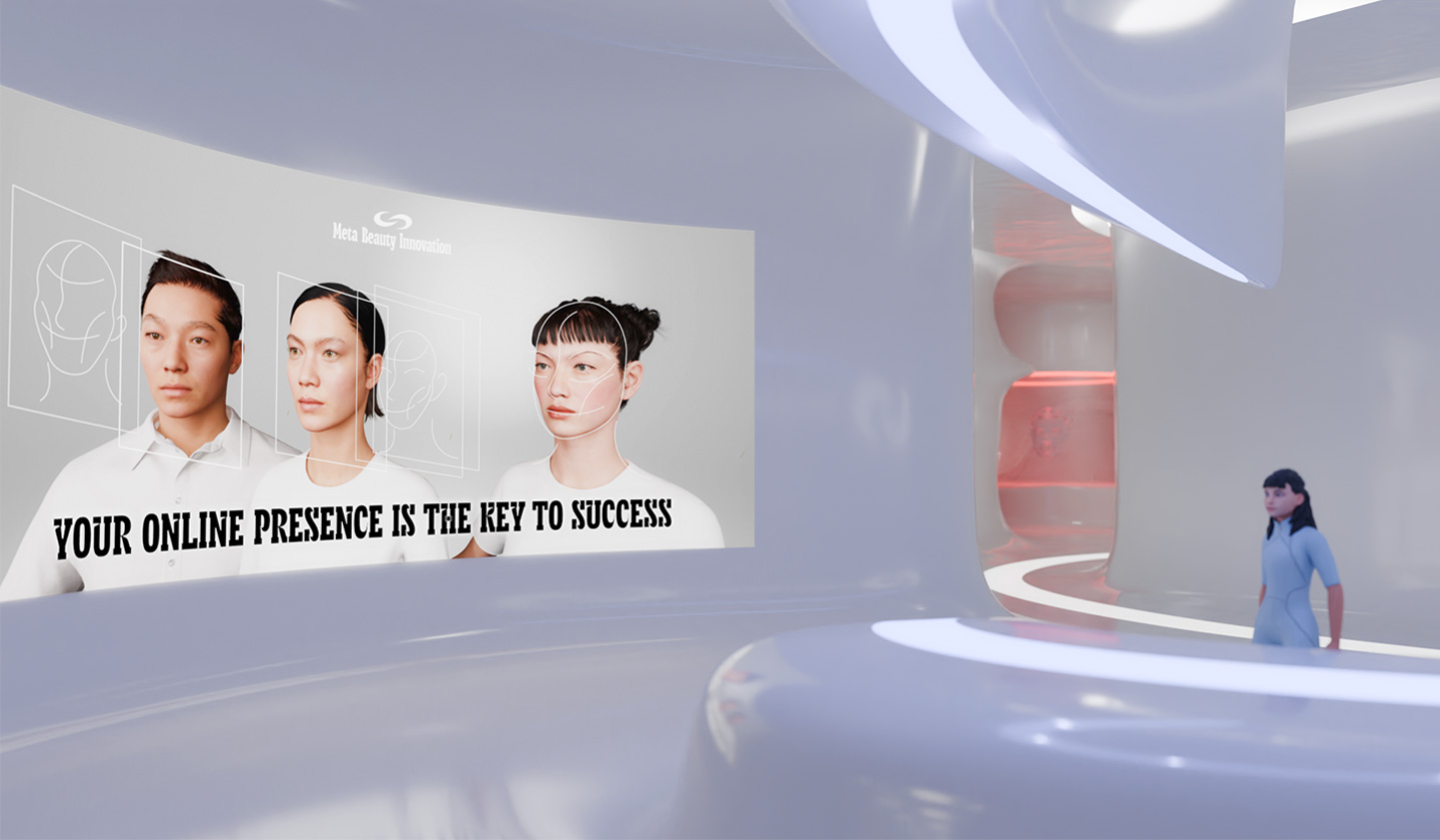 Sora Park,
Meta Beauty Innovation, 2024 ©Sora Park
Sora Park,
Meta Beauty Innovation, 2024 ©Sora ParkIn other words, Soft
Touch creates personas for its fictional protagonists and brings the
imagined story into physical space through text, video, and sculptural models.
This science fiction narrative further expands in the 2024 3D video work
Meta Beauty Innovation.
The video unfolds around the fictional
characters ‘Dr. Sara’ and ‘Kim James’ from Soft Touch, who
establish a virtual beauty device company and launch their developed products
along with premium services.
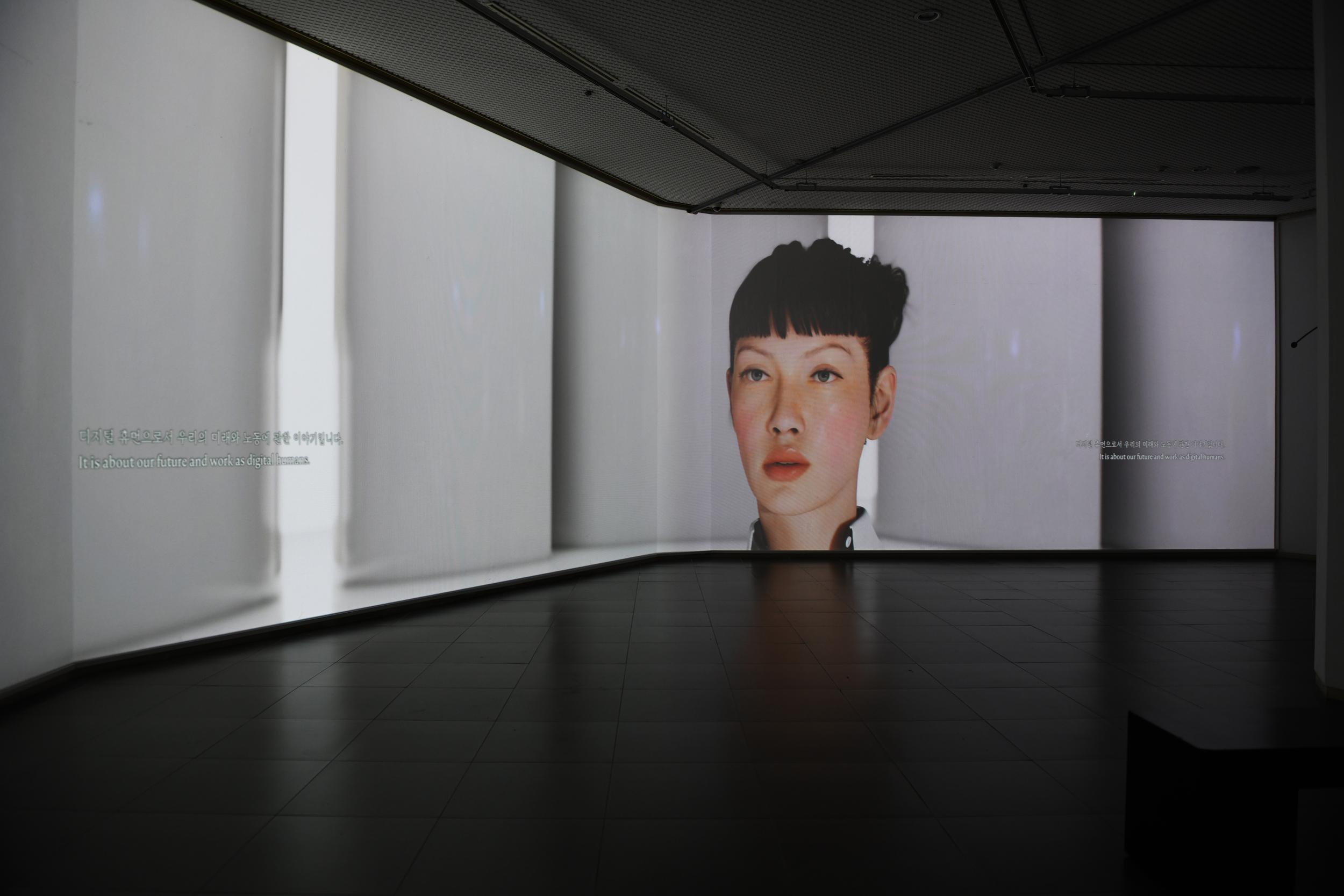 Installation view
of 《Meta Beauty Innovation》 (Daegu Arts Center,
2024) ©Daegu Arts Center
Installation view
of 《Meta Beauty Innovation》 (Daegu Arts Center,
2024) ©Daegu Arts CenterThe video, presented in the format of a product launch event, features the fictional IT company ‘Meta Beauty Innovation’ introducing their innovative beauty solution, ‘I-Meta,’ designed for future digital humans. The company explains the device’s features, functions, usage environments, and target users. Meanwhile, viewers at the exhibition can experience the new product firsthand by trying it on virtually using Instagram face filters.
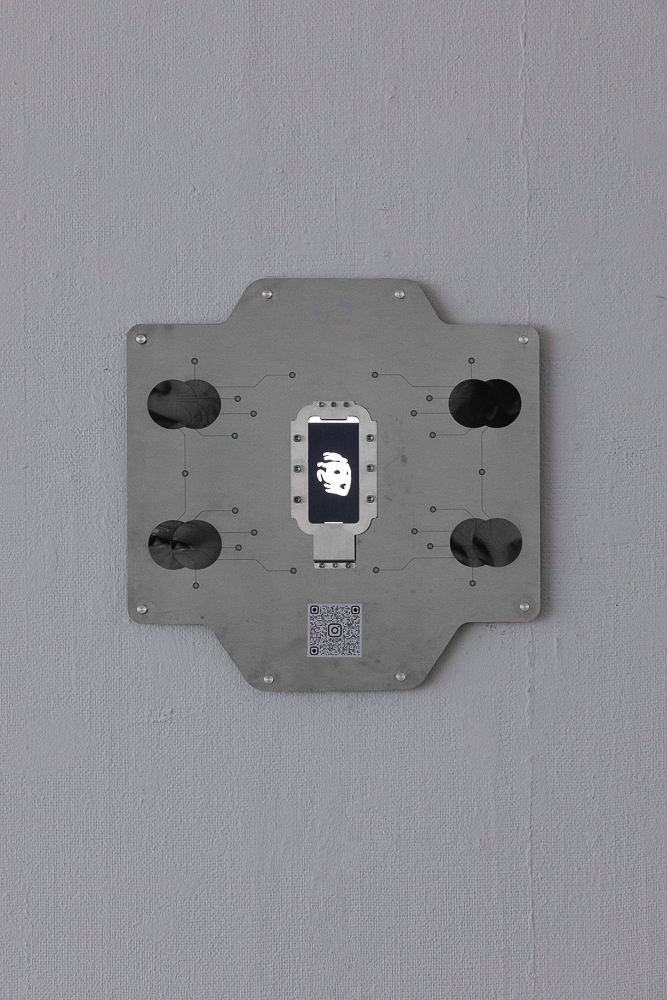 Installation view
of 《Meta Beauty Innovation》 (Daegu Arts Center,
2024) ©Daegu Arts Center
Installation view
of 《Meta Beauty Innovation》 (Daegu Arts Center,
2024) ©Daegu Arts CenterThrough this work, Sora Park explores how
traditional concepts of appearance and the body might change with advances in
digital image processing technology and metaverse environments. Starting from
the idea of a virtual body in which appearance can be freely altered with a
single click—like today’s beauty filters on social media—she imagines the
future of digital humans.
In this future virtual world, aging and
death do not exist, and there are no limits to changing or redesigning one’s
innate physical form. As a result, obsessions with appearance or physical flaws
disappear, giving rise to new forms of desire and value.
Her work invites us to imagine what new
desires and products might emerge in future societies shaped by the interaction
between social values and technology. Through futuristic thinking, it blurs the
boundaries between digital and reality, offering immersive experiences.
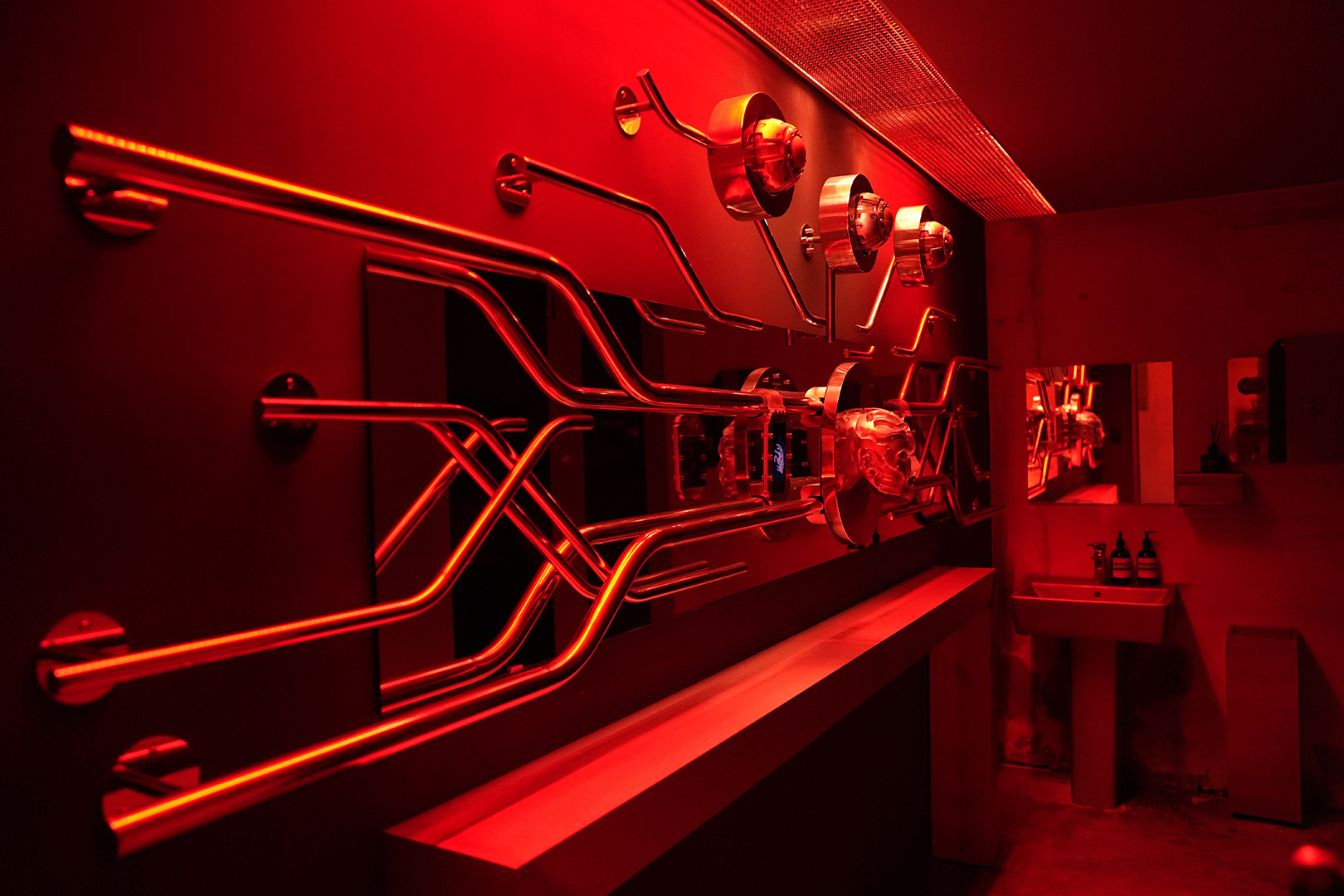 Sora Park,
NeoTex Depot, 2023, Site-specific Installation ©Sora Park
Sora Park,
NeoTex Depot, 2023, Site-specific Installation ©Sora ParkIn a similar vein, the project NeoTex
Depot (2023) was inspired by a storage facility for wearable devices
used by digital humans living in a futuristic digital space. It envisions the
wearable beauty device I-Meta for future virtual humans and recreates it in the
form of sculptural models. Realistic skin textures, resembling human flesh, are
also incorporated into the sculptures and installed together within the
exhibition space.
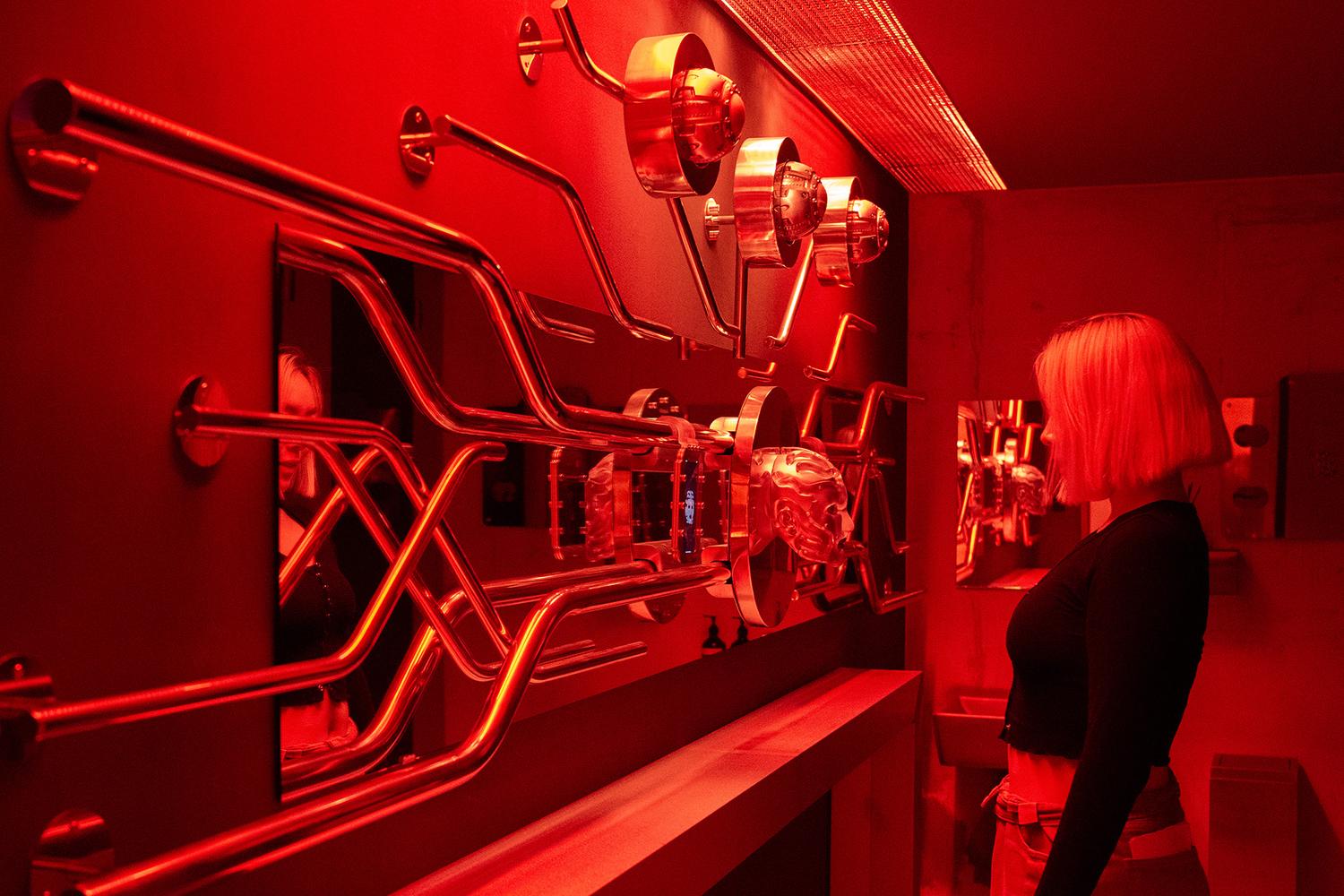 Sora Park,
NeoTex Depot, 2023, Site-specific Installation ©Sora Park
Sora Park,
NeoTex Depot, 2023, Site-specific Installation ©Sora ParkSora Park presented this project in a
public restroom, a space that is both highly private and public in nature. She
explained that since such spaces are used for people to check their own
appearances in public, they share spatial similarities with social media, which
inspired her to incorporate this idea as part of the work.
Therefore, the project explores the
boundaries between present and future, virtual and real, and public and private
spaces through the combination of the imagined device prototype, the public
restroom setting, and Instagram filters.
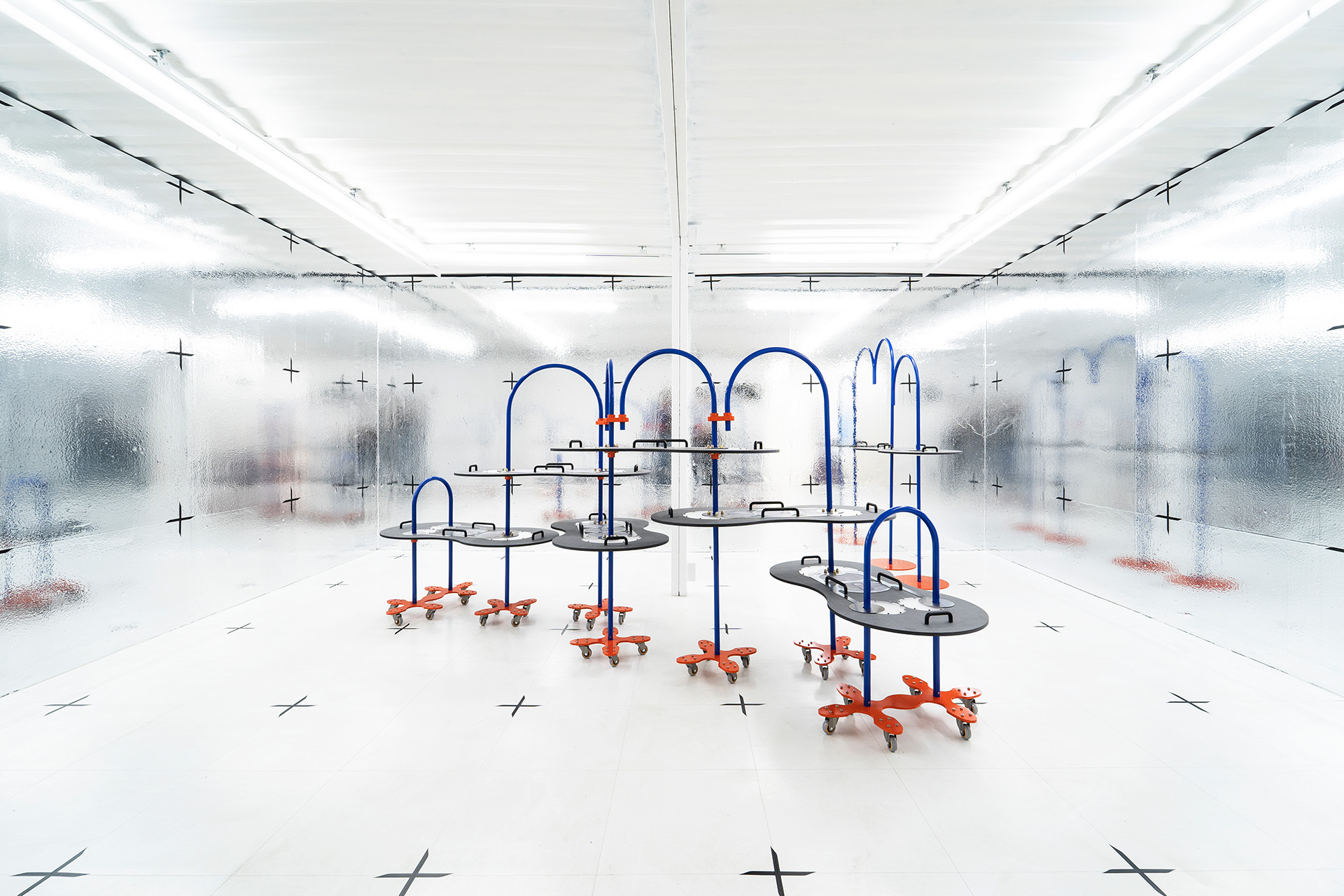 Sora Park,
City Fence, 2022, Mixed media, Dimenions variable ©Sora Park
Sora Park,
City Fence, 2022, Mixed media, Dimenions variable ©Sora ParkAt the same time, Sora Park has focused on
the changing bodily experiences that occur as one moves between physical and
digital spaces, creating participatory installation works that use the viewer’s
body as a medium to reproduce the sensory gap felt at the boundary between the
two worlds.
Her ongoing project since 2022,
City Fence, is an installation designed so that viewers can
freely change its position and shape. It physically realizes an interface that
functions as a fence in the virtual world, bringing it into physical space.
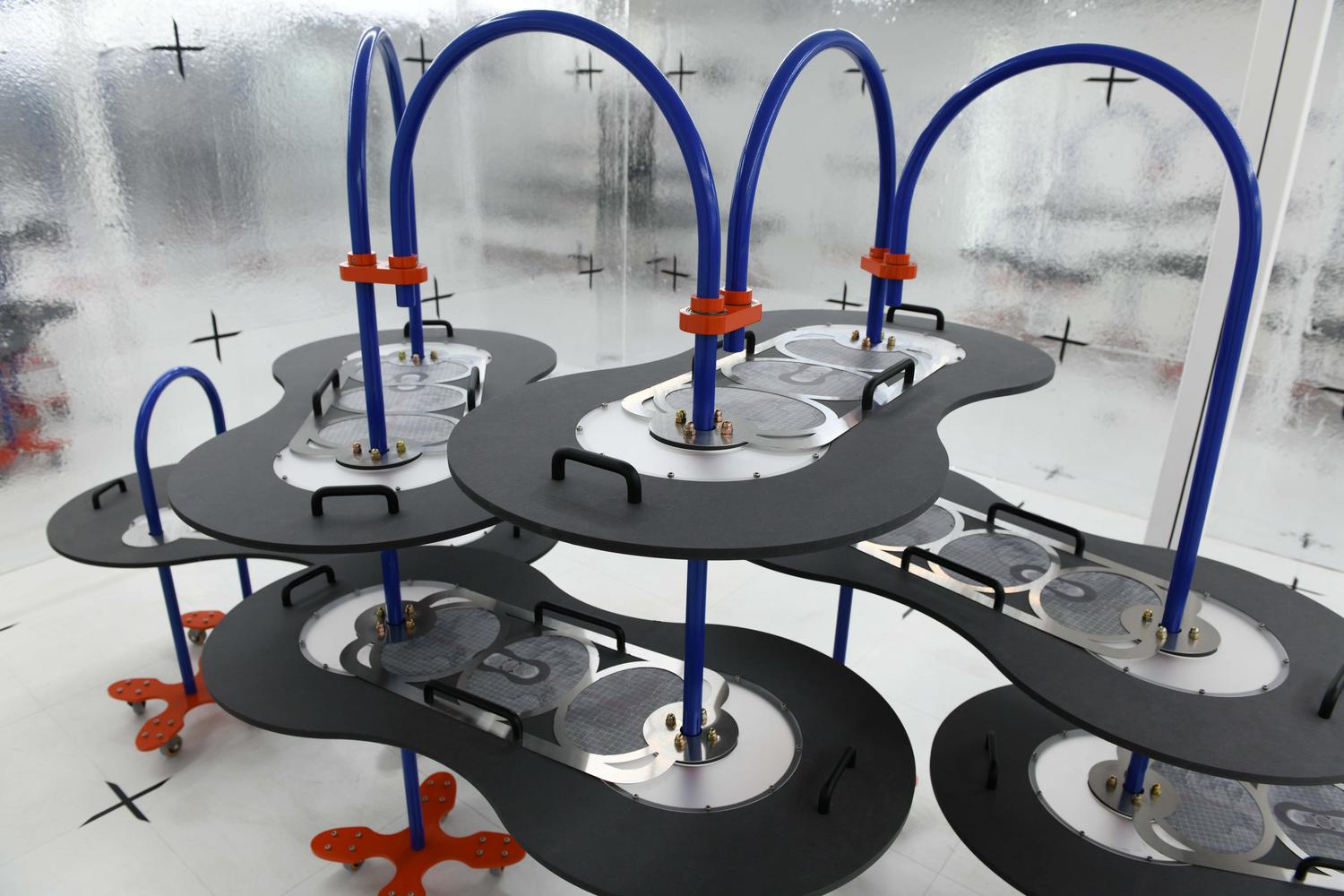 Sora Park,
City Fence, 2022, Mixed media, Dimenions variable ©Sora Park
Sora Park,
City Fence, 2022, Mixed media, Dimenions variable ©Sora ParkJust as fences in the physical world serve
as boundaries that partition urban spaces, interfaces in the digital realm act
as boundaries that divide and segment digital spaces. We experience these two
different dimensions not only in distinct ways but also perceive the
differences when moving from one space to another. In particular, as we
navigate between these spaces, our bodies encounter new emotions and sensations
that were previously unknown.
The artwork locates the body—which had been
experienced as data through digitalization—back into the physical world, thus
restoring the body as a measure of space. Within the interface space reproduced
as tangible objects, viewers once again move these objects using their bodies
as the medium.
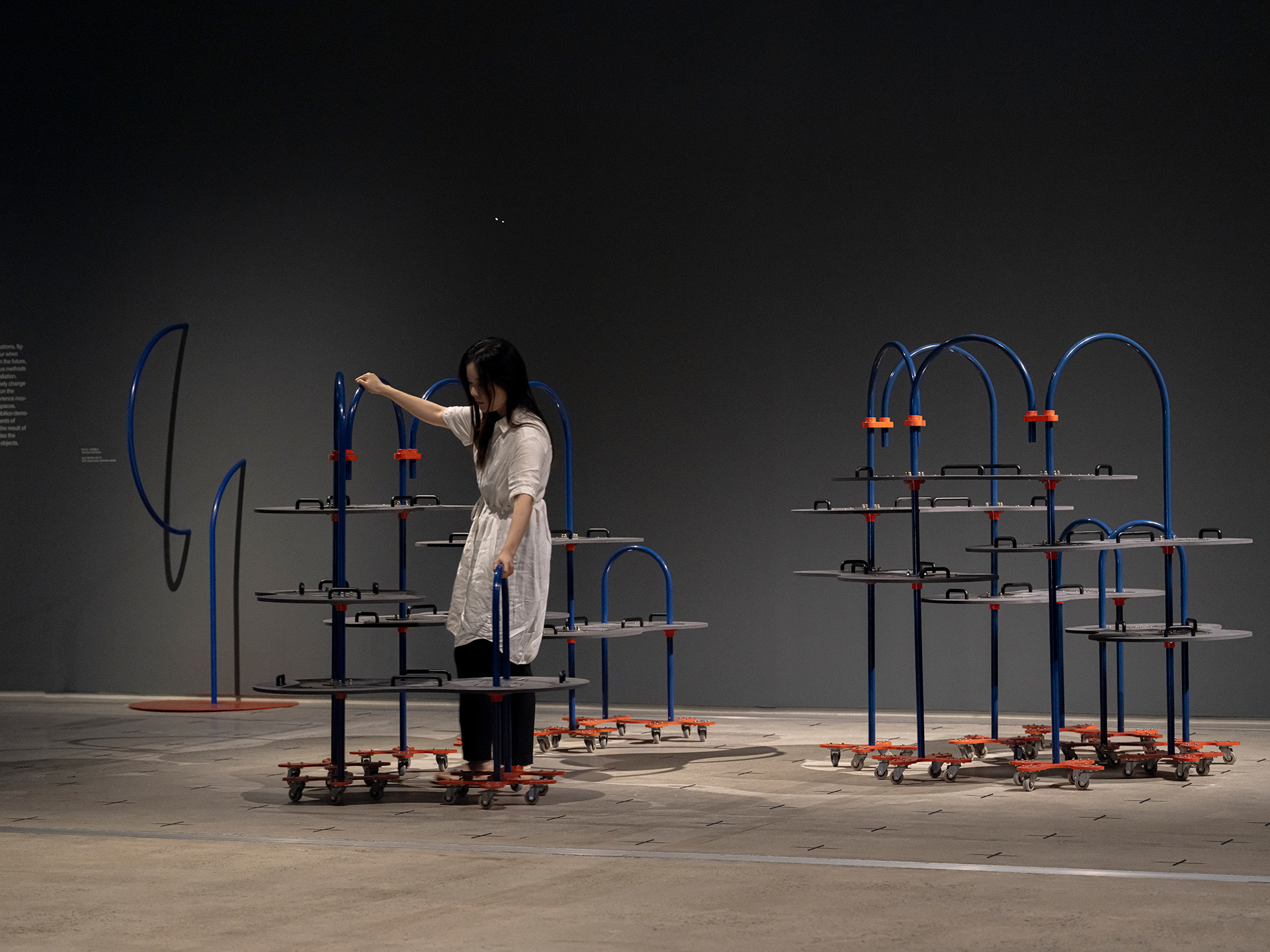 Sora Park,
City Fence, 2022, Mixed media, Dimenions variable,
Installation view of 《What Things Dream About》 (MMCA, 2024) ©Sora Park
Sora Park,
City Fence, 2022, Mixed media, Dimenions variable,
Installation view of 《What Things Dream About》 (MMCA, 2024) ©Sora ParkHowever, unlike in virtual spaces, the
human body inevitably returns as an unstable entity subject to physical factors
such as space, gravity, and speed. Beyond these physical influences, viewers
are also inevitably affected by the shapes created and left behind by previous
viewers—that is, by the objects themselves.
This work, which unfolds through the mutual
interaction between the digital interface transformed into physical objects and
the human body, offers an experience where the datafied body is placed back
into the physical world, allowing bodily sensations to be newly reactivated as
a measure of space.
Sora Park’s work prompts us to reconsider
our bodies, minds, and daily lives as they change alongside advances in science
and technology. By imagining a future in which these changes and their
resulting challenges deepen, her work questions how we should redefine the
boundaries between reality and the virtual world that surround us.
“I wanted to highlight that in digital
media environments, especially social media spaces, our bodies and daily lives
are being capitalized on and commodified as images, which are then consumed.
The explosive development of digital image processing technologies and the
overwhelming abundance of images greatly influence the ways we distribute and
consume images.” (Sora Park,
from the BE(ATTITUDE) interview)
 Artist Sora Park ©Seoul
Foundation for Arts and Culture and Sora Park. Photo: Minjung Kang.
Artist Sora Park ©Seoul
Foundation for Arts and Culture and Sora Park. Photo: Minjung Kang.Sora Park studied painting at Dongguk
University and Seoul National University before earning her MFA at Goldsmiths,
University of London, UK. Her solo exhibitions include 《Meta Beauty Innovation》 (Daegu Arts Center,
Daegu, 2024), 《Dark Closet》 (Keep-in-Touch,
Seoul, 2022), 《Soft Prologue》
(523 Kunst Doc, Busan, 2022), 《Item Inventory》 (Suseong Artpia, Daegu, 2021), among others.
Park has also participated in numerous
group exhibitions, including 《What Things Dream About》
(MMCA, Seoul, 2024), 《Through You》
(PS Center, Seoul, 2024), the 7th Changwon Sculpture Biennale Prologue 《Speaking About the Future: Shape, Map, Tree》 (Seongsan Art Hall, Changwon, 2023), 《Summer
Exhibition》 (Royal Academy of Arts, London, 2022), 《Data Jungwon》 (Kim Hee Soo Art Center,
Seoul, 2022), 《New Contemporaries 2021》 (Firstsite, Colchester, 2021), and 《London
Grads Now》 (Saatchi Gallery, London, 2020).
Sora Park was selected as one of the ‘Young
Artists of the Year’ at Daegu Arts Center in 2024 and was also chosen for the
UK’s ‘Bloomberg New Contemporaries 2021’. She is currently an
artist-in-residence at Seoul Art Space Geumcheon in 2025.
References
- 박소라, Sora Park (Artist Website)
- 비애티튜드, 완벽한 아이디어는 없다
- 서울문화재단, [예술인 아카이브] 박소라_시각예술/조각 미디어 설치
- 매일신문, 대구예술발전소 9~12월 '2021 수창동 스핀오프'전, 2021.08.31
- 대구문화예술회관, [전시 소개] Meta Beauty Innovation (Daegu Arts Center, [Exhibition Overview] Meta Beauty Innovation)
- 국립현대미술관, [작품 소개] 사물은 어떤 꿈을 꾸는가 (National Museum of Modern and Contemporary Art, Korea (MMCA), [Artwork Description] What Things Dream About)


















